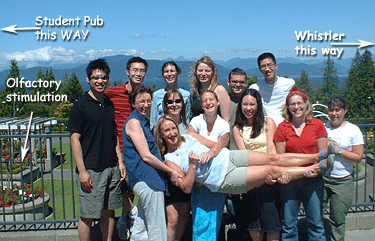 
    
|
|

What do we do in
the Roskams' Lab?
Our lab is interested in the regulation of normal and abnormal
nervous system development, and in determining how understanding
these mechanisms may be exploited to stimulate regeneration when
cells of the nervous system become injured. Many different types
of neurons and glia co-exist throughout the brain, however, and
their genesis, at different times in different brain regions, creates
a confusing milieu in which to study events that occur early in
embryogenesis. To overcome this, most of our discovery research
has historically utilized a simple, fascinating and uniquely talented
part of the nervous system - the olfactory system.
The olfactory neuroepithelium (OE) is one of the most primitive
parts of the nervous system. It contains Olfactory Receptor Neurons
(ORNs) which are the only recognized projection neurons capable
of successfully replacing themselves and re-targeting their axons
from the peripheral to central nervous system in a mature animal.
In the last 10 years, our research in the olfactory system has revealed
novel types of olfactory stem cells, novel mechanisms used by transplanted
olfactory-based glia to mediate spinal cord repair, and different
ways we may be able to prevent neuronal death in the developing
and injured nervous system. All the research we currently perform
looks beyond the olfactory system into the brain and is aimed at
understanding (1) Neural stem cell regulation; (2) Glia-based mechanisms
of stimulating regeneration and brain repair and (3) How the DNA
of cells within our brain becomes increasingly more specialized
as we stimulate our brain (epigenetic regulation of brain development
and function).
The Lab is split into 3 research groups focused on each of these
questions, whose interests become more intertwined the deeper we
probe into some of the intrinsic mechanisms common to each.
Dr. Jane Roskams, Rm 3309, Department of Zoology,
Life Sciences Building, University of British Columbia
2350 Health Sciences Mall
Vancouver, B.C. V6T 1Z3
Canada
Office: 604 827 5080
Fax: 604 827 5085
Lab: 604 827 5082
roskams@zoology.ubc.ca
| Lab Photos-
under construction. Watch this space. |
| |
...at work |
...at play |
Lab
Protocols
|


